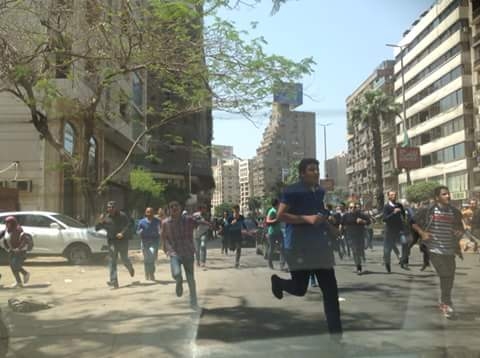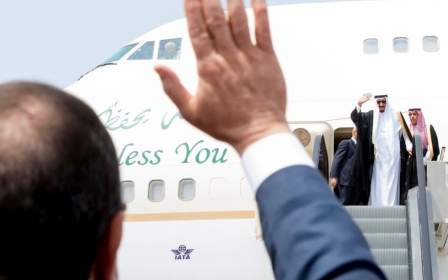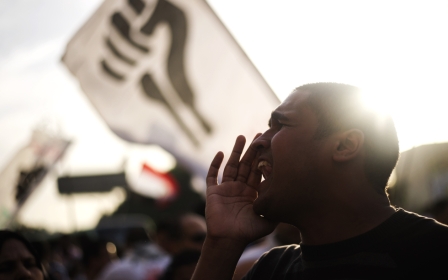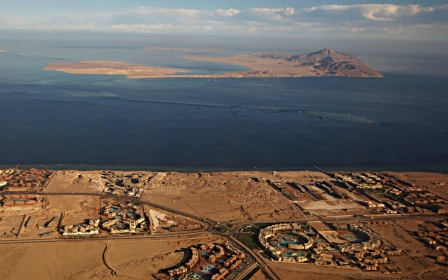Thousands join protests in Egypt against Red Sea islands deal
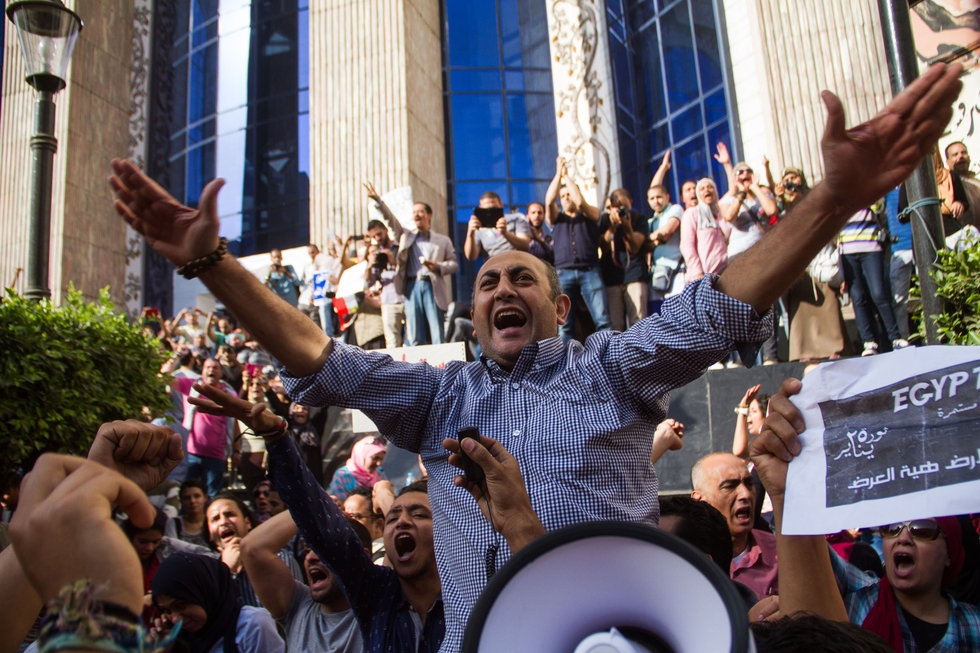
Thousands of protesters took to the streets of Cairo on Friday to picket the government's decision to hand over two Red Sea islands to Saudi Arabia, with authorities moving in to disperse the crowds and reportedly firing tear gas and warning shots.
President Abdel Fattah al-Sisi, meanwhile, spoke at a housing and tourism project, saying he feared "Egypt might be broken”.
“I am not concerned about the outside, but I am very concerned about the inside because of the planning of the devils,” he said, adding that the “powers of evil don't want Egyptians to see what we are achieving because they want to destroy all the components of the state".
Demonstrators chanted slogans from the 2011 Arab Spring uprising, saying: "People want the downfall of the regime," MEE contributor Belal Darder said.
They also shouted: "Sisi, Mubarak, we don't want you, leave," in reference to long-time strongman Hosni Mubarak, who was ousted during the 2011 revolution and to current President Sisi, who led a military coup against Mubarak's successor, the Muslim Brotherhood's Mohamed Morsi.
Though authorities accused the Brotherhood of organising the protests, which took place in violation of Egypt's strict protest law, several groups had called for the demonstrations, including the banned April 6 movement, some political parties and former presidential candidate Hamdeen Sabahi. Such unity among these groups has been rare in recent years.
"Many Islamists were there among the protesters, but they didn't mention Morsi's name in their chants and did not call for his presidential legitimacy [to be restored]," Darder said "They just participated and went with the crowds.
"It felt like the old days of the revolution, with Islamists, liberals, the old and young, men and women together all taking over the streets."
Police had been on high alert overnight for the protests, but they did not stop people from congregating in Cairo's iconic Tahrir Square where the 2011 revolution began. Later, the protesters were forcibly ejected and the square closed, but many smaller protests marches were redirected to congregate on the steps of the Journalists' Syndicate. Police tried to block access but thousands of people were able to gather there for several hours, Darder said.
Police riot vans surrounded the protesters from all sides, but the rally remained largely peaceful for several hours before police reportedly deployed tear gas and shot live ammunition into the air, activists said.
Some 50 people were arrested, activists and security sources told Reuters.
Footage shot at the scene and shared by prominent comedian Bassem Youssef showed crowds chanting: "Bread, freedom and the islands are Egyptian," an updated version of a chant that became widespread during the 2011 uprising.
Some media reported only several hundred people gathered, but Darder said the crowd numbered in the thousands.
"The youth of the revolution are still here," Abdelrahman Abdellatif, 29, an air conditioning engineer, told Reuters. "We are experiencing unprecedented fascism and dictatorship."
A small counter-protest in the coastal city of Alexandria saw activists hold up pictures of Sisi and King Salman of Saudi Arabia, as well as a banner reading: "The islands belong to Saudi Arabia".
Sisi earlier this week defended the controversial transfer, saying the islands were never the legal property of Egypt and that there were "security and political reasons" for granting Saudi Arabia sovereignty over the disputed territory.
In expectation of major unrest on Friday, police had "encircled" major routes into Cairo overnight on Thursday in an attempt to shut down the rallies, with the Interior Ministry warning Egyptians not to get "carried away by tendentious calls for protests".
The ministry said increased security around the capital was to prevent what it called "infiltration of the terrorist group" - a reference to the banned Muslim Brotherhood, which it said called for the march.
The April 6 movement on Friday afternoon posted a photo it said showed demonstrators running from tear gas fired during a march that set out from the Muhandiseen district after Friday prayers, aiming to join up with the bigger protest in Tahrir Square.
The April 6 Movement was formed in 2008 and mobilised to protest against then-president Hosni Mubarak.
Since that time it has been designated a terrorist organisation by Sisi's government, and many of its leaders are in jail awaiting trial.
“Our right to this land is won by blood, not by documents and maps,” wrote organisers on the event’s Facebook page, which shows images of Egyptian soldiers in the island of Tiran in 1967.
“We gave more than 100,000 martyrs in our wars with Israel to restore this land. [The Red Sea islands of] Tiran and Sanafir are our right, Egypt’s right, the right of our children and of our ancestors who were killed there. This right must be returned, even over our dead bodies.”
The Muslim Brotherhood said "that no one has the right to abandon the property and resources of the Egyptian people in exchange for a fistful of dollars".
The move by Sisi has been criticised by many as being illegal and has provoked a storm of criticism on social media.
- Additional reporting by Belal Darder
New MEE newsletter: Jerusalem Dispatch
Sign up to get the latest insights and analysis on Israel-Palestine, alongside Turkey Unpacked and other MEE newsletters
Middle East Eye delivers independent and unrivalled coverage and analysis of the Middle East, North Africa and beyond. To learn more about republishing this content and the associated fees, please fill out this form. More about MEE can be found here.


